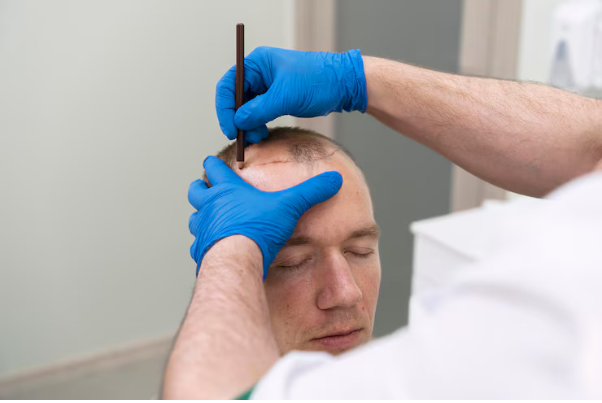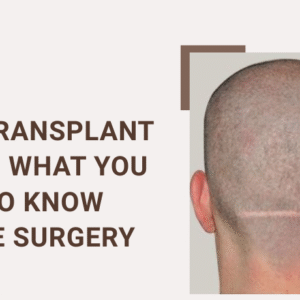A hair transplant is a medical operation that moves hair from one place of your head to another. Most of the time, hair is removed from the back or sides of your head and put where it has thinned down or fallen out. These places are usually on the front of the head or at the top, close to the hairline.
The hair on the back or sides is stronger and not as quickly impacted by the hormone that makes hair fall out. The hair keeps growing like it always has when you move it. It looks and feels natural since it’s your own hair. You can wash, trim, and style the transplanted hair after a few months.
Different Kinds of Hair Transplants
There are two basic kinds of hair transplant surgeries. Both can work well, but the doctor will tell you which one is best for you.
FUT or Follicular Unit Transplantation
FUT takes a strip of skin from the back of the skull. These bits are called grafts and are clipped off the strip. There are a few hairs in each transplant. These go in the places that are bald or thinning. FUT could create a scar on the back of your head, but it lets the doctor relocate more hair at once.
FUE, or Follicular Unit Extraction
Using a tiny instrument, individual hair follicles are removed one at a time in FUE. After that, the hairs are put in the bald places. FUE doesn’t leave a significant scar, and it typically heals faster. People who prefer short hair or a technique that isn’t as obvious typically choose it.
How to Make Sure Hair Transplantation Works
A transplant won’t work if you don’t take care of yourself properly thereafter and live a healthy life. It’s important to pay attention to certain behaviours if you want your new hair to grow well.
Don’t Smoke
Smoking slows down blood flow, which has a direct effect on hair follicles that are trying to settle and develop. Nicotine also blocks the oxygen and nutrients your scalp needs to repair. You provide the follicles the right conditions to live and grow by not smoking before and after surgery.
Get enough sleep.
Most people don’t know how powerful sleep is. The body heals tissue and gets its vitality back during deep sleep. After a transplant, obtaining 7 to 9 hours of good sleep every night helps you mend and provides your new hair the greatest opportunity to grow strong. Don’t sleep in ways that might put pressure on the transplanted region or toss and turn.
Manage Diabetes
If you have diabetes, it’s very important to keep your blood sugar levels steady. Bad control might make it harder for your body to recover and raise the chance of getting sick. High blood sugar levels also damage tiny blood vessels, which makes it harder for nutrients to reach the roots of the hair. The transplant is far more likely to work if your disease is under control. Before scheduling surgery, the best hair transplant clinic in Lucknow will look at your medical history.
Is a Hair Transplant Permanent?
Yes, hair transplants usually last for good. The hair that is transplanted originates from places where hair loss is less likely to happen, so it stays in place for years or perhaps a lifetime. But keep in mind that the hair around it may still get thinner over time. That implies that even while the strands that were transplanted stay, the look of the whole thing might alter. This is why you might need to check in and make changes every so often. Regular visits to the best hair transplant clinic and maintenance help keep the final appearance full and natural for as long as feasible.
Conclusion
A hair transplant may change your life in more ways than one, giving you not just a new look but also a new feeling of self. It’s not only about having the operation and going on with your life. There are several things that might affect how well the surgery works, including as your health, lifestyle, and the clinic you pick. The best hair transplant clinic in Gurgaon will make sure that professionals help you every step of the way, from the first consultation to the last day of care.





